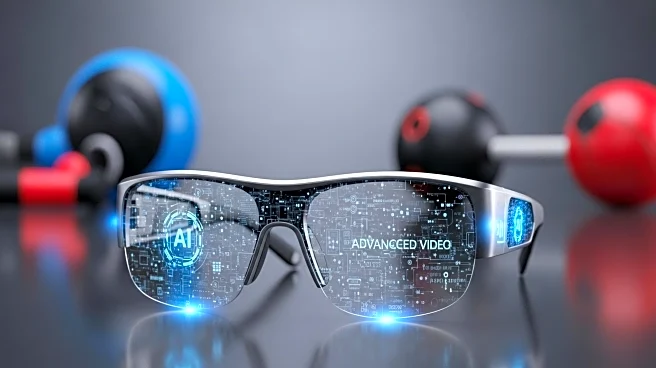What is the story about?
What's Happening?
Oakley has launched the Meta HSTN AI glasses, designed specifically for sports enthusiasts. These smart glasses feature the ability to record 3K video, offering a significant upgrade from previous models that were limited to 1080p. The glasses are equipped with longer battery life, lasting up to 8 hours, and provide excellent audio quality for calls and music playback. The design of the HSTN glasses is tailored for action sports, with a snug fit to ensure they remain secure during physical activities. Despite these advancements, the glasses do not yet support 60 fps recording, although this feature is expected to be available later in the fall.
Why It's Important?
The introduction of the Oakley Meta HSTN AI glasses marks a significant development in the smart glasses market, particularly for sports enthusiasts seeking high-quality video recording capabilities. The ability to capture 3K video enhances the user experience, providing clearer and more detailed footage, which is crucial for documenting sports activities. The extended battery life and improved audio quality further enhance the functionality of these glasses, making them a viable option for athletes and active individuals. However, the lack of 60 fps recording and lower water resistance compared to upcoming models may limit their appeal to some users.
What's Next?
Oakley plans to introduce the ability to record in 60 fps for the Meta HSTN glasses later this fall, although this will be limited to 1080p resolution. Additionally, the upcoming Oakley Meta Vanguard glasses, set to release at the end of October, will offer higher water resistance and 60 fps recording capabilities, potentially overshadowing the HSTN model. As the market for smart glasses continues to evolve, consumers will have more options to choose from, depending on their specific needs and preferences.
Beyond the Headlines
The launch of the Oakley Meta HSTN AI glasses highlights the growing trend of integrating advanced technology into wearable devices, particularly for sports applications. This development raises questions about privacy and data security, as these glasses are equipped with cameras and audio capabilities. As smart glasses become more prevalent, manufacturers will need to address these concerns to ensure user trust and compliance with privacy regulations.















